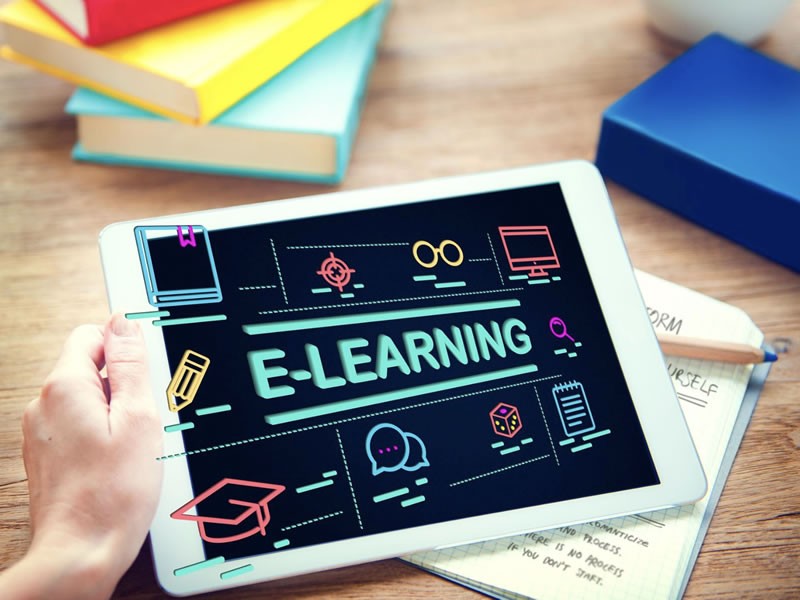Insight Blog
Agility’s perspectives on transforming the employee's experience throughout remote transformation using connected enterprise tools.
14 minutes reading time (2788 words)
The Rise of E-Learning: Revolutionizing Education in the Digital Age
Online learning has transformed education in the digital age. Explore its growth, Challenges and Future Directions.
The historical evolution of online learning platforms has paved the way for their current growth and popularity in the digital age.
In their early stages, online courses primarily relied on text, lacking the interactive elements that are now commonplace. However, technological advancements have transformed online learning, making it more engaging and accessible than ever.
Today, these platforms offer an extensive array of courses, catering to diverse interests and industries.
Today, these platforms offer an extensive array of courses, catering to diverse interests and industries.
Subjects span from computer programming and data analysis to creative writing and photography, covering nearly every imaginable field. Online learning platforms now function as virtual marketplaces, connecting learners with expert instructors worldwide.
Several factors contribute to the widespread adoption of online education. The convenience and flexibility it offers have attracted a diverse range of learners. Whether it's working professionals seeking to upskill or students facing geographical constraints, online education provides a flexible and accessible alternative to traditional classroom-based learning.
This article delves into the various facets of e-learning and examines its impact on the educational landscape.
Several factors contribute to the widespread adoption of online education. The convenience and flexibility it offers have attracted a diverse range of learners. Whether it's working professionals seeking to upskill or students facing geographical constraints, online education provides a flexible and accessible alternative to traditional classroom-based learning.
This article delves into the various facets of e-learning and examines its impact on the educational landscape.
What is e-learning in education
E-learning, short for electronic learning, refers to the use of electronic technologies, primarily the internet, to facilitate and deliver educational content and experiences.
In the context of education, e-learning encompasses a wide range of activities, resources, and platforms that leverage digital technology to support teaching and learning processes. It includes online courses, virtual classrooms, interactive multimedia content, discussion forums, and various digital tools designed to enhance educational experiences.
E-learning offers the flexibility for learners to access educational materials and participate in courses remotely, often on digital devices such as computers, tablets, or smartphones. This mode of learning has become increasingly popular due to its accessibility, convenience, and the ability to cater to diverse learning styles.
Key components of e-learning in education include online courses, learning management systems (LMS), multimedia resources, and collaborative tools that facilitate communication and interaction among students and instructors. E-learning can be synchronous, involving real-time interactions, or asynchronous, allowing learners to engage with content at their own pace. For example, an AI math solver assists students in understanding math concepts and solving complex problems step-by-step.
Overall, e-learning has become an integral part of modern education, providing opportunities for flexible and personalized learning experiences beyond the traditional classroom setting.
Key Features of E-Learning Platforms
- Enhancing Accessibility - Learners now have the flexibility to access educational materials from any location, eliminating both geographical and time constraints.
- Customized Learning Paths - Numerous platforms provide personalized learning experiences, tailoring the educational journey to match the pace and preferences of individual learners.
- Interactive Learning Elements - E-learning transcends passive video consumption. Many platforms incorporate quizzes, assignments, and interactive forums, enriching the learning experience with engaging and participatory content. Recognizing the unique needs of each learner, some services offer personalized assistance, such as a math tutor in Orange County, to help students master challenging concepts. This tailored approach ensures that educational content is not only interactive but also highly effective in meeting individual learning goals.
- Progress Monitoring - Learners can monitor their advancement, undertake assessments, and attain certificates upon successfully completing a course, contributing to a sense of achievement and recognition.
- Integration of Gamification - In addition to the mentioned features, gamification elements are increasingly being integrated into e-learning platforms. Gamification adds game-like elements such as points, badges, and rewards to make the learning experience more enjoyable and motivating, further enhancing learner engagement and participation.
The Influence of Technological Progress on Online Education
The continuous evolution of technology has significantly impacted online learning, shaping the landscape of education in 2024 and beyond. The integration of cutting-edge technologies has revolutionized how individuals access educational content, making online learning more dynamic, interactive, and accessible than ever before.
One notable impact of technological advancements is the rise of immersive learning experiences. Virtual reality training and augmented reality technologies have found their way into online education, providing learners with realistic simulations and hands-on experiences.This not only enhances the quality of education but also creates a more engaging and memorable learning environment.
Artificial intelligence (AI) and machine learning (ML) have played a pivotal role in personalizing the learning experience. These technologies analyze user behavior, adapt content based on individual learning styles, and provide targeted feedback, fostering a more tailored and effective educational journey. As a result, learners can benefit from customized learning paths that cater to their unique strengths and weaknesses.
The widespread adoption of mobile devices and the ubiquitous nature of high-speed internet have also contributed to the rise of e-learning. With the majority of the global population having access to smartphones and reliable internet connections, learners can now access educational content anytime, anywhere.
This accessibility has democratized education, breaking down geographical barriers and providing opportunities for individuals around the world to pursue their learning goals.
Looking ahead, the future of online learning is likely to be shaped by advancements in technologies such as blockchain, 5G connectivity, and the Internet of Things (IoT). These technologies have the potential to further enhance collaboration, security, and real-time data analysis in online education.
As the technological landscape continues to evolve, the rise of e-learning is expected to persist, offering learners innovative and transformative educational experiences.
The Emergence of E-Learning Platforms
The emergence of E-Learning platforms in 2024 is reshaping the landscape of education, presenting a transformative impact on the industry.
As we navigate the post-pandemic era, the adoption of E-Learning has witnessed significant momentum, with organizations across diverse sectors embracing this innovative approach to education.
The statistics reflecting the adoption of E-Learning since the onset of the pandemic are compelling.
Educational institutions, businesses, and various organizations have increasingly turned to online learning solutions to meet the evolving demands of a digital-first world. These platforms have not only served as a response to the challenges posed by the pandemic but have become integral to the ongoing evolution of education.
Organizations have recognized the adaptability and accessibility offered by E-Learning platforms, leading to a surge in their adoption.
The convenience of remote learning, personalized learning paths, and the interactive nature of online education are among the factors driving this trend. As a result, the statistics showcase a notable shift in how education is delivered and consumed.
In this dynamic landscape, the impact of E-Learning platforms extends beyond immediate adaptations to pandemic-related disruptions. It represents a fundamental shift in the educational paradigm, offering opportunities for continuous learning, skill development, and professional growth.
The statistics pertaining to the adoption of E-Learning platforms underscore the industry's acknowledgment of the need for flexible and technology-driven educational solutions in the contemporary world.
Elearning gamification is a notable trend within these platforms, enhancing engagement through interactive elements. It's interesting to note how gamification in e-learning can significantly boost the effectiveness of educational apps.
What is e-learning in education
E-learning, short for electronic learning, refers to using digital technologies, primarily the internet, to deliver educational content and experiences. It spans various activities, resources, and platforms that enhance teaching and learning through technology. From online courses and virtual classrooms to multimedia content and interactive tools, e-learning is reshaping how education is delivered and consumed.
Key features of e-learning include:
- Online Courses: Structured learning programs accessible remotely, allowing students to acquire knowledge and skills in diverse subjects, including certifications like Microsoft AZ-204 Practice Tests Dumps.
- Learning Management Systems (LMS): Platforms that organize, deliver, and track learning progress. These systems enable both synchronous learning (real-time interactions) and asynchronous learning (self-paced engagement).
- Multimedia Content: Interactive videos, presentations, and simulations make complex concepts easier to understand and engage learners effectively.
- Collaboration Tools: Features like discussion forums, group projects, and live chats facilitate communication and collaboration among learners and instructors.
E-learning's flexibility allows learners to access materials from anywhere, using devices such as computers, tablets, or smartphones. This accessibility accommodates diverse learning styles and schedules, making it especially valuable for professionals preparing for certifications like the Microsoft AZ-204, enabling them to study on their own terms.
Whether synchronous or asynchronous, e-learning provides a personalized, scalable, and adaptable learning experience. Its integration into education has redefined traditional learning, offering unparalleled opportunities for personal and professional growth.
Personalized Learning Experiences
- Individualized Learning Paths: E-learning platforms empower learners to create personalized learning journeys, allowing them to focus on topics and skills that align with their specific needs and interests.
- Flexible Learning Speeds: Unlike traditional classrooms with fixed pacing, e-learning enables individuals to set their own learning speeds. Learners can progress at a pace that suits their understanding and mastery of the material.
- Tailored Content Selection: Learners have the freedom to choose content that resonates with their learning preferences. This could include multimedia presentations, interactive modules, or additional resources based on individual learning styles.
- Adaptive Learning Technologies: Incorporating adaptive learning technologies ensures that content adapts in real-time based on the learner's performance. This dynamic adjustment allows for a truly personalized educational experience, catering to the specific needs and learning styles of each student.
The impact of personalized learning in e-learning extends beyond just academic achievement; it fosters a sense of ownership and autonomy, promoting a positive learning experience.
E-learning not only addresses the diverse needs of learners but also maximizes the potential for knowledge retention and skill development.
Follow us and access great exclusive content everyday: Follow us on Google News
Accessibility and Flexibility
E-learning serves as a powerful catalyst in breaking down traditional barriers associated with education, ushering in an era where learning is more accessible than ever before.
The removal of geographical and time constraints is a cornerstone of e-learning, providing individuals the opportunity to acquire knowledge at their convenience, irrespective of their location or time zone.
Key Aspects of Enhanced Accessibility in E-Learning:
- Time Flexibility: E-learning allows learners to access educational materials at any time, offering the flexibility to study during non-traditional hours. This is particularly beneficial for individuals with varied schedules, such as working professionals or those managing familial responsibilities.
- Geographical Inclusivity: The geographical barriers that often limit educational opportunities are dismantled by e-learning. Whether a student resides in a remote village or a professional seeks further training, education becomes accessible to anyone, regardless of their physical location.
- Flexibility for Diverse Commitments: E-learning caters to individuals managing multiple commitments, such as work or family responsibilities. The flexibility it provides allows learners to seamlessly integrate education into their lives without compromising on other essential aspects.
- Universal Access: The availability of e-learning platforms transforms education from being perceived as a privilege to a fundamental right. The accessibility of educational resources empowers everyone to learn whatever they want, wherever they are, and whenever they choose. This inclusivity fosters a learning environment that is open and accessible to all.
E-learning, by breaking down barriers, contributes to the creation of a more inclusive and equitable educational landscape.
Through the removal of traditional constraints, it ensures that learning becomes a universal opportunity, empowering individuals from diverse backgrounds and circumstances to pursue education on their terms.
The Influence of Technology on E-Learning
E-learning is inherently technology-driven, undergoing continuous evolution to deliver dynamic and interactive learning experiences. Technology plays a pivotal role in enabling diverse learning styles, offering students access to a wide range of educational resources.
From virtual classrooms to AI-powered tutors, technology facilitates varied and engaging modes of learning.
Notably, virtual reality (VR) and augmented reality (AR) contribute to the creation of realistic simulations and interactive environments, providing a more hands-on and practical approach to the learning process.
The importance of e learning in education is the ongoing integration of technology ensures that e-learning remains at the forefront of innovative and immersive educational experiences.
You may also like: Best Apps for Employees: UPDATED 2022 – A Complete Guide
Challenges and Future Directions
While e-learning offers numerous advantages, it encounters hurdles that include the digital divide, sustaining student engagement, and upholding the quality of online content.
As we peer into the future, these challenges become catalysts for innovation and advancement in e-learning.
The trajectory is anticipated to revolve around augmenting interactivity, expanding access, and integrating online learning seamlessly with traditional educational approaches.
There's a growing imperative to confront issues related to cybersecurity and data privacy, guaranteeing the safety and security of all users on e-learning platforms.
Challenges in E-Learning:
- Digital Divide: Disparities in access to technology and the internet pose challenges in ensuring equal educational opportunities for all learners.
- Student Engagement: Maintaining sustained interest and active participation in e-learning environments remains a challenge, requiring creative solutions to enhance engagement.
- Quality Assurance: Ensuring the caliber of online content and instructional methods is crucial to the effectiveness of e-learning, demanding ongoing efforts in quality assurance.
Future Directions in E-Learning:
- Enhanced Interactivity: Innovations in technology will likely focus on enhancing interactivity, providing more engaging and immersive learning experiences.
- Improved Access: Efforts will be directed towards addressing the digital divide, striving to make e-learning more accessible to a broader and more diverse audience.
- Integration with Traditional Methods: Future developments will seek to seamlessly integrate online learning with traditional educational methods, creating a cohesive and comprehensive learning environment.
The Evolving Landscape of Online Education: Emerging Trends and Predictions
Advancements in technology are propelling the continuous evolution of online learning, fundamentally reshaping the landscape of education.
The rapid progress of cutting-edge technologies, including artificial intelligence, virtual reality, and augmented reality, is bringing about a profound transformation in the realm of online education. These technologies hold the promise of crafting immersive and personalized learning experiences, elevating learner engagement and outcomes.
Envision a scenario where students can immerse themselves in a virtual classroom, interacting with peers and instructors in real-time, irrespective of their physical locations. Through virtual reality, learners can explore historical sites, partake in scientific simulations, and conduct hands-on experiments—all within the confines of their homes. This heightened level of interactivity and authenticity has the potential to revolutionize online learning, making it more engaging and impactful than ever before.
Online learning has transcended its status as an alternative and has become an integral part of the education ecosystem. It is expected to coexist harmoniously with traditional classroom-based learning, offering flexible and hybrid models that cater to diverse learner needs. This paradigm shift has opened up a realm of possibilities, granting students access to high-quality education without being confined by geographical or time-related constraints.
While embracing the potential of online education, it is imperative to acknowledge and address the accompanying challenges.
Educational institutions and instructors must adapt their teaching methodologies to effectively incorporate these innovative technologies. Continuous evaluation and enhancement of online learning experiences are essential to ensure alignment with the evolving needs of learners.
The future of online education necessitates educators to cultivate new skills and competencies. Proficiency in leveraging emerging technologies, particularly artificial intelligence, is crucial for crafting personalized learning experiences. Additionally, educators must possess the ability to foster a sense of community and collaboration in online classrooms, recognizing the pivotal role of social interaction in the learning process.
Looking forward, the trajectory of online learning appears promising, brimming with potential. With strategic approaches and investments, a learning environment can be cultivated that is inclusive, engaging, and accessible to all.
The possibilities are limitless, and the transformative impact on education as a whole is poised to be substantial.
Free ebook: How To Get Your Intranet Off The Ground
Wrapping up
Opting for online education is a decision driven by various compelling factors, contributing to the overwhelming sentiment among students today—90 percent of whom believe that online learning offers an experience on par with or superior to the traditional classroom setting.
The suitability of this alternative hinges on individual circumstances, needs, and aspirations. While acknowledging that online education may not suit everyone, it stands out as a convenient option with an array of possibilities for international students across the globe.
The ascent of e-learning signifies a substantial transformation in the educational landscape. It has ushered in an era of continuous learning, surpassing the confines of conventional education. As technology progresses, the methodologies of learning and teaching will evolve in tandem.
E-learning is not a passing solution or a fleeting trend; it has ingrained itself as a vital component of the future of education, perpetually adjusting and expanding to cater to the evolving requirements of learners on a global scale.
Embracing this digital revolution opens the door to limitless potential for transformative learning experiences.
Categories
Blog (2676)
Business Management (328)
Employee Engagement (213)
Digital Transformation (179)
Growth (122)
Intranets (120)
Remote Work (61)
Sales (48)
Collaboration (40)
Culture (29)
Project management (29)
Customer Experience (26)
Knowledge Management (21)
Leadership (20)
Comparisons (7)
News (1)
Ready to learn more? 👍
One platform to optimize, manage and track all of your teams. Your new digital workplace is a click away. 🚀
Free for 14 days, no credit card required.















